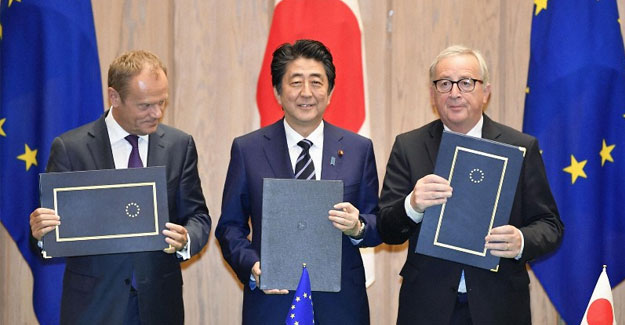
Japan-EU Free Trade Pact Enters Into Force
Japan's economic partnership agreement with the European Union entered into force on February 1, creating a free trade area that covers about a third of the world's economy. The pact will eliminate tariffs on most reciprocal trade, encourage business investment and ensure the protection of intellectual property rights, as Japan and the European Union hope to provide a strong counter to creeping protectionism amid a US-China tariff war. Under the pact, which was signed in July and ratified in December after five years of negotiations, consumers will gain access to cheaper imported food items, while the elimination of duties on industrial products will help curb costs for exporters. In all, Japan will scrap tariffs on around 94% of agricultural and industrial products and the European Union will end duties on around 99% of imports. Japan's Prime Minister Shinzo Abe has pinned his hopes on the pact, along with an 11-member trans-Pacific free trade agreement that took effect in December, as a growth driver for the world's third largest economy. Intellectual property rights protection is another key feature of the agreement. Japan and the European Union will each protect product names associated with their origin, called "geographical indications," such as Kobe beef and Japanese sake. According to a Japanese government estimate, the trade initiative will give a roughly 5 trillion yen (US$ 45.7 billion) boost to the economy and lift Japan's real gross domestic product by nearly 1%. When combined with the revised Trans-Pacific Partnership agreement, the economic impact is estimated at around 13 trillion yen. Japan and the European Union - together accounting for about 30% of the world's GDP - are separately planning to start negotiations with the United States as President Donald Trump pushes for bilateral deals to fix what he considers imbalanced trade relationships. While Japan scrambled to salvage the original TPP following an abrupt departure by the United States in 2017, it also stepped up negotiations with the European Union to conclude their own free trade agreement. The entry into force of the trade deal is a major achievement for Japan and the European Union as they strive to promote free trade, but the UK's planned exit from the bloc is casting a shadow of uncertainty over the future, trade experts say. The UK, where many Japanese companies operate, is seen as willing to take part in the revised TPP, formally called the Comprehensive and Progressive Agreement for Trans-Pacific Partnership. The current members have said the CPTPP is open to all economies that can meet its high standards, while setting procedures for more countries to join.
Textile Excellence
If you wish to Subscribe to Textile Excellence Print Edition, kindly fill in the below form and we shall get back to you with details.












